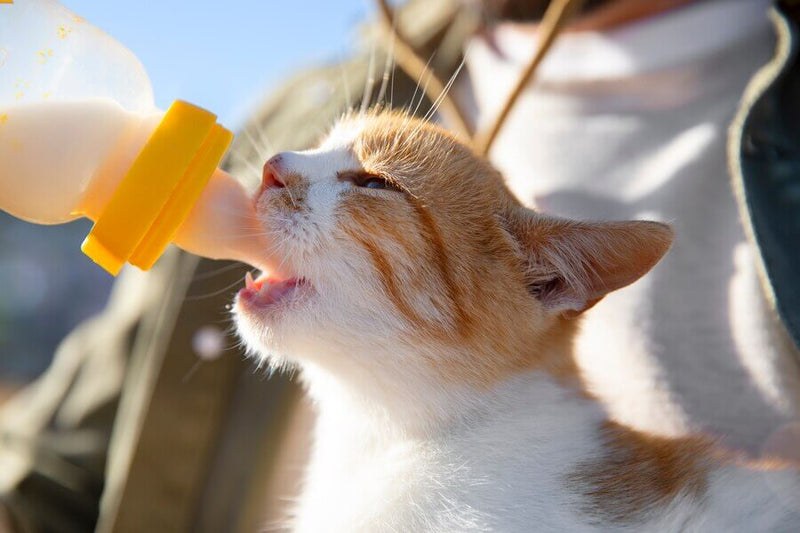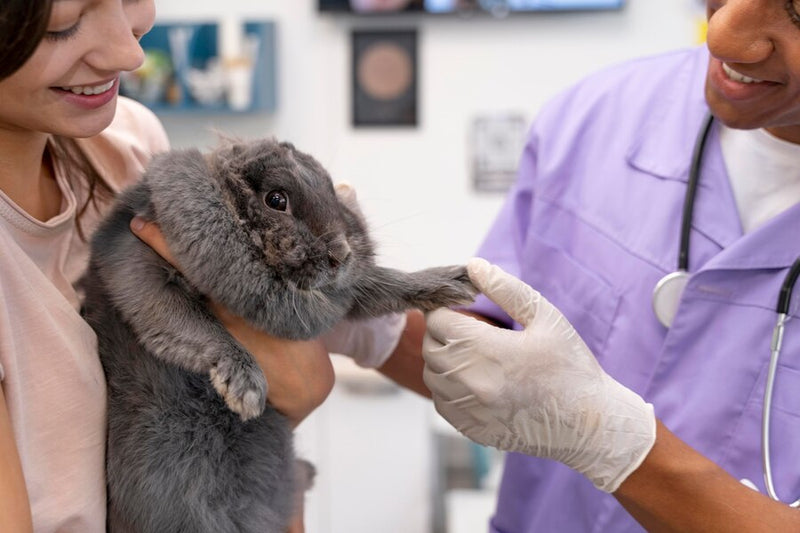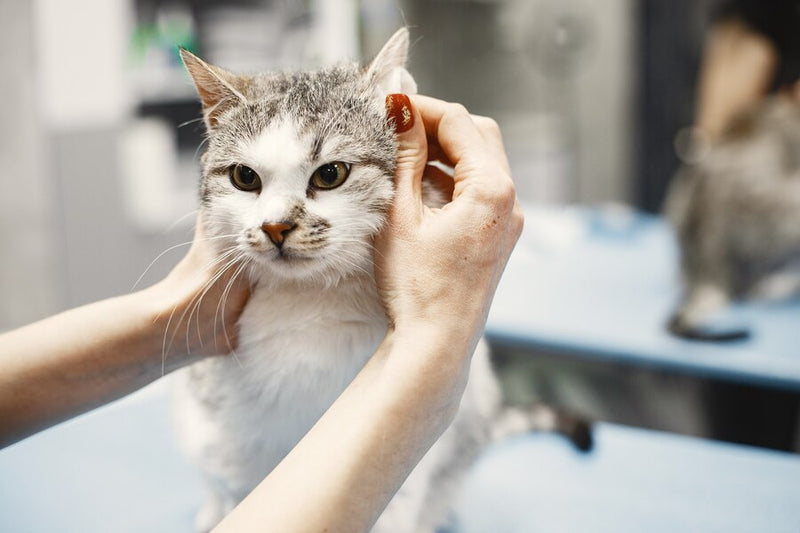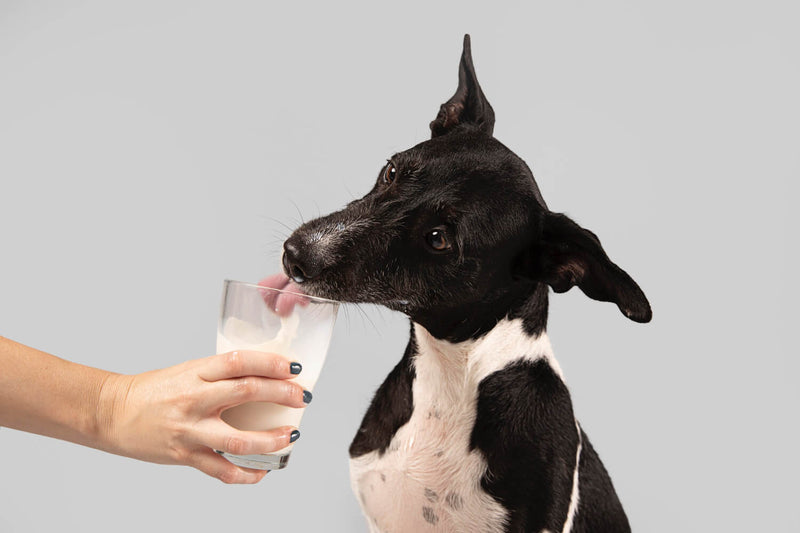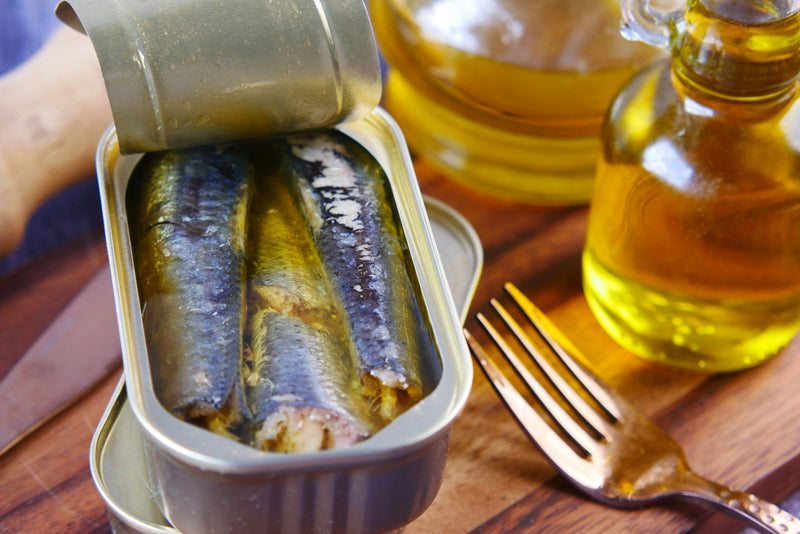
Welcome to Gritty Pet Co.
Your Canadian, specialty Pet Health & Wellness destination. 🇨🇦

Vet Reviewed & Approved
Dr. Ibrar A. is our veterinarian and a key member of our team. ✅
Welcome to the world of probiotics for cats, where a sprinkle of science in your cat's diet can work wonders for their well-being. Probiotics, tiny, beneficial bacteria, are not just a health trend; they're a cornerstone for your feline's digestive health, immunity, and even mood (1).
Let's dive into how these microscopic helpers can make a big impact on your cat's life!
Key Takeaways
Probiotic Strain Matters: Not all probiotics are created equal. Lactobacillus and Bifidobacterium strains are particularly beneficial for cats, supporting digestive health and immune function. Ensure you're choosing a product tailored for felines with a high CFU count and multiple strains for optimal benefits.
Consultation is Key: Always consult with your veterinarian before introducing probiotics into your cat's diet, especially if they have pre-existing health conditions. A professional can recommend the right product and dosage, ensuring a safe and effective regimen.
Introduction and Administration: Introduce probiotics gradually to your cat's diet to minimize the risk of digestive upset. Powders mixed into food tend to be the easiest to administer, but the method should align with your cat's preferences to ensure they receive the full benefit.
Life Stage Adaptation: Probiotics' benefits extend across all life stages, from kittens through to senior cats. However, the specific needs at each stage—such as growth, maintenance, or age-related health concerns—should guide the choice of probiotic formula, ensuring it's aligned with the unique requirements of your cat's current life phase.
Unlocking the Power of Probiotic for Cats
Have you ever considered that the key to your cat's digestive health might lie in probiotics? These powerful microorganisms, already popular among humans for their health benefits, are making waves in the feline world too. But what makes them so special for your furry friend, and how can you ensure you're using them correctly?

Key Benefits & Short vs. Long Term Use
It's time to zoom in on the tangible benefits of probiotics for your beloved cat. From immediate relief to long-term wellness, discover how these tiny agents of change can revolutionize your pet's health journey, one gut microbe at a time (2).
- Digestive Health: Probiotics help maintain a balanced gut microbiome, leading to improved nutrient absorption and reduced symptoms of digestive upset such as diarrhea or constipation. This supports your cat's overall digestive wellness, ensuring they get the most out of their food.
- Immune Support: By enhancing the gut flora, probiotics also play a crucial role in supporting the immune system. A healthy gut microbiome can help prevent infections and diseases by boosting the body's natural defenses, making your cat more resilient to illnesses.
- Mood Improvement: The gut-brain axis means that a healthy digestive system can influence your cat's mood and behaviour positively. Probiotics can help reduce stress and anxiety in cats, leading to a happier, more contented pet. This benefit is especially valuable for cats facing changes in their environment or routine as it can help to positively influence their emotional well-being.
- Short-Term Relief: Initially, probiotics can address acute gastrointestinal issues like diarrhea or constipation by restoring gut microbiome balance. They're also beneficial during or after antibiotic treatment to replenish beneficial gut bacteria disrupted by medication.
- Long-Term Health Maintenance: Over weeks to months, probiotics support overall gut health, contributing to better nutrient absorption, enhanced immune response, and prevention of chronic gastrointestinal disorders. They can also aid in the management of chronic enteropathies by improving intestinal barrier function and immune regulation.
Life Stages and Probiotics
Just like us, cats go through different stages in life, each with its own set of challenges and joys. In this section, we'll explore how probiotics can be tailored to suit your cat's evolving needs, ensuring they thrive at every turn of their whiskers.
Kittens: They can greatly benefit from probiotics, especially those who are bottle-fed and not exposed to their mother's beneficial bacteria. Probiotics support the growth of good gut bacteria, crucial for their developing digestive systems.
Adult Cats: A daily regimen of probiotics can help maintain their digestive health and manage stress, dietary changes, or the aftermath of antibiotic treatments.
Senior Cats: As they age, cats might face more gastrointestinal challenges. Probiotics can aid in maintaining a healthy gut flora, which is essential for their overall health.
Form Factors and Administration Tips
Administering probiotics shouldn't be a daunting task—it should be as easy as giving your cat a treat (or close to it!).
Powder or Liquid: These forms are beneficial as they cover the entire digestive tract more effectively than capsules or tablets. They can be easily mixed with food for effortless consumption.
Capsules: While not the preferred form due to their focus on the lower GI tract, capsules can be opened and sprinkled over food if needed.
Probiotic-Enriched Food: Some cat foods come fortified with probiotics, offering a convenient way to incorporate these beneficial bacteria into your cat's diet.
Top 5 Actionable Advice
Choose a probiotic supplement with multiple strains, including at least Enterococcus and Bifidobacterium, to ensure a broad range of benefits.
Opt for the highest CFU (colony-forming units) per dose you can find to maximize the probiotics' efficacy.
Consult your vet to select the right probiotic tailored to your cat's specific needs, whether for digestive issues, immune support, or anti-inflammatory purposes.
Consider your cat's life stage and breed when choosing a probiotic. Different breeds and ages may have varying needs and sensitivities.
Regular administration is key. Probiotics can be given daily to support overall digestive health, especially important for cats recovering from antibiotic use or experiencing dietary changes.

Risks or Considerations
Despite the myriad benefits, it's essential to proceed with caution, especially for cats with specific health conditions or those who are immunocompromised (4). Here are some considerations:
Adverse Effects: While generally safe, probiotics can cause minor side effects like gas and bloating in some cats, especially when starting supplementation. These usually resolve with continued use or dose adjustment.
Strain-Specificity: The efficacy of probiotics is highly strain-specific, so it's important to choose products backed by scientific research and targeted toward your cat's specific needs.
Quality and Safety: Not all probiotic products meet the same quality standards. Opt for products from reputable manufacturers that have been clinically studied.
Long-term Dependency: While beneficial, probiotics should not replace veterinary care for underlying health issues. They're best used as part of a comprehensive health plan tailored to your cat's specific needs.
Breed Considerations: While there's limited research on breed-specific responses to probiotics, individual sensitivities and health profiles should guide probiotic selection. Consult with your veterinarian to tailor the choice and dosage of probiotics to your cat's breed, age, and health status.
Incorporating probiotics into your cat's regimen can offer numerous benefits, but it's crucial to approach supplementation thoughtfully and under the guidance of a veterinary professional to ensure the best outcomes for your feline friend.
FAQ
1.What are the benefits of giving probiotics to my cat?
Probiotics support your cat's digestive health, helping to maintain a balanced gut microbiome. This can lead to improved nutrient absorption, reduced symptoms of digestive upset such as diarrhea or constipation, and enhanced overall health. Probiotics also support the immune system and can reduce unpleasant odors from the litter box (iHeartCats.com, I Love Veterinary).
2.How do I choose the right probiotic for my cat?
Look for probiotics tailored to cats, with strains like Lactobacillus (3) and Bifidobacterium, which are beneficial to their specific digestive systems. Choose products with multiple strains and a high colony-forming unit (CFU) count for the best results. Consider your cat's dietary needs and preferences, such as flavor and whether they have sensitivities to certain ingredients (Cats.com, Chewy.com).
3.Can all cats benefit from probiotics?
Yes, most cats can benefit from probiotics. They are especially helpful for managing acute and chronic digestive issues, supporting cats during stressful times, and restoring gut health after antibiotic use. However, it's essential to introduce probiotics gradually and consult your vet, especially for cats with health conditions or sensitivities (Cats.com, I Love Veterinary).
4. Are there any side effects of probiotics for cats?
While probiotics are generally safe, some cats may experience mild digestive disturbances, such as gas or changes in stool consistency, when first introduced to them. These symptoms typically resolve as the cat's system adjusts. Always start with a lower dose and monitor your cat's response (Today's Veterinary Practice).
5. How should I administer probiotics to my cat?
Probiotics for cats come in various forms, including powders, capsules, and chewable treats. Powdered forms can be easily mixed into your cat's food, making them a convenient choice for most pet parents. Ensure the probiotic is thoroughly mixed with food or dissolved in water to encourage full consumption and effectiveness (iHeartCats.com, Cats.com).
Top 3 YouTube Videos on Probiotics for Cats
1. What are Probiotics for Cats & How Do They Help? (A Vet Explains)
Why Watch: Get a veterinarian's perspective on how probiotics can benefit your cat's health, including the science behind how they work and tips for choosing the right one.
2. The 7 Best Probiotics For Your Cat | We Tested Them All
Why Watch: Explore the best products you can consider for your cat.
3. Probiotics for Kittens: Be a Probiotics PRO!
Why Watch: This video is perfect for those caring for kittens, highlighting the importance of probiotics in early life stages and how they contribute to a healthy digestive system.
External Links for Further Reading
- Purina - Probiotics for Cats Benefits -Explore more about probiotics for cats and their benefits with insights from Purina. Visit Here.
- PetVet Cat Health & Probiotics - Delve deeper into the intersection of cat health and probiotics with expert advice from Pet Vet. Visit Here.
- Providence Animal Hospital - Dive into the discussion on whether probiotics could improve your cat's gut health. Visit Here.
A Final Word on Probiotics for Cats
Incorporating probiotics into your cat's routine is more than just a health trend—it's a proactive step towards ensuring their overall well-being. By understanding the nuances of strain selection, administration techniques, and potential considerations, you're empowered to champion your furry friend's health journey with confidence.
Remember, the key lies in consistency, patience, and a keen eye for your cat's individual needs. With probiotics as your ally, you're not just nurturing their gut; you're nurturing their vitality, resilience, and happiness. Here's to many more years of purrs, playfulness, and feline contentment!
References
- 1. Yang, Q., & Wu, Z. (2023). Gut Probiotics and Health of Dogs and Cats: Benefits, Applications, and Underlying Mechanisms. Microorganisms, 11(10), 2452.
- 2. Chandler, M. (2016). Probiotics in dogs and cats. Vet Times, 43, 10-11.
- 3. Fusi, E., Rizzi, R., Polli, M., Cannas, S., Giardini, A., Bruni, N., & Marelli, S. P. (2019). Effects of Lactobacillus acidophilus D2/CSL (CECT 4529) supplementation on healthy cat performance. Veterinary Record Open, 6(1), e000368.
- 4. Doron, S., & Snydman, D. R. (2015). Risk and safety of probiotics. Clinical Infectious Diseases, 60(suppl_2), S129-S134.




